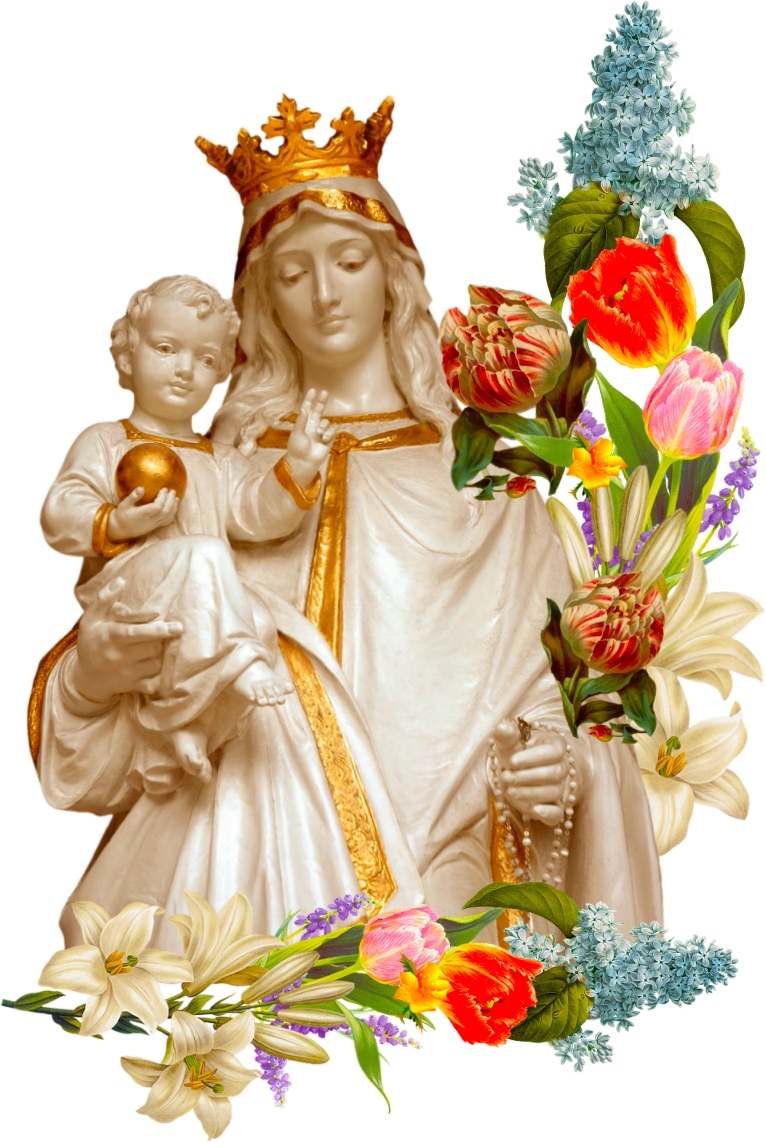  The
Beauty
and Truth
of the
Catholic
Church Sermon XXII: Grace, the Incarnation and the Mother of God Grace is truly a great, sublime and heavenly good, which surpasses a million fold all the goods of this world. Earthly goods, after a brief life and possession, pass away forever, but grace leads to eternity. The former can never satisfy the human heart, and much less fill it with peace and joy. But grace can accomplish this, and that, too, in such a measure that sanctified souls are the happiest on earth. But with this the riches of grace are by no means exhausted. It is also the cause of faith, hope and love, the root of all Christian virtues and source of all merits for eternal life. Grace purifies man from all sin and elevates human nature to God and consequently makes men heirs of Heaven. In amazement over this, King David exclaims: "What is man that thou art mindful of him? Or the son of man that thou visitest him? Thou hast made him a little less than the Angels, thou hast crowned him with glory and honor." [Ps. 8, 5, 6] The glory and greatness of sanctifying grace is so sublime and Godlike, that it would almost seem that outside of God there could be no greater mystery in Heaven or on earth, and no more sublime dignity given to man. And yet there is a greater mystery, the mystery of the Incarnation of the Son of God. And there is a greater dignity than that which grace gives to the soul, the dignity of the Mother of God. The more that we meditate on these two most sublime, mysteries the more glorious Divine grace appears with a new beauty and greatness, so that we can in many ways apply the words of the Archangel Gabriel addressed to the Blessed Virgin Mary to every Christian soul that is sanctified by grace: "Thou art full of grace, the Lord is with thee." Therefore we will meditate today on the glory of Divine grace with reference to the Incarnation of the Son of God and the Blessed Virgin, Mother of God. O Jesus, assist us with Thy grace! 1. Our Redemption which God promised in Paradise consists in this, that the Son of God became man in order that He might suffer for us and offer up for us a Bloody Sacrifice of Atonement on the Cross. As God, Jesus could neither suffer nor visibly appear on earth, but as a mere man He could not redeem us either, because His sufferings and Sacrifice could not have had for us that infinite and inexhaustible merit demanded. Not even the Angels, even the highest and holiest of them, were in a position to save man from his sins, and to render to God congruous satisfaction. Only the Incarnate Son of God could do this. The Son of God, through the Incarnation, united His Divine Nature with the human in one and the same Divine Person, so that He was from that time on true God and true man. But the human nature was not transformed into the Divine, but so marvelously incorporated with the Divine that it belongs to it, and has a Divine dignity. Now through the grace which Our Divine Savior has merited for us we are indeed not made Divine, but we preserve our human nature and personality, while we are made like to God, receive Godlike qualities, and become children of God and co-heirs of Christ. The Son of God humbled Himself in that He took on the form of a servant, and became man, in order to redeem us, but we are elevated, since we, poor miserable men, are made like to God and participators in His Divine Nature. Herein consists precisely the wonderful difference between the Incarnation of the Son of God and the grace which is ours by reason of the Incarnation. The prophet Isaias foretold in the most striking manner the humiliation of the Son of God: "Despised, and the most abject of men, a man of sorrows, and acquainted with infirmity; and His look was as it were hidden and despised; whereupon we esteemed Him not. He hath born our infirmities and carried our sorrows: and we have thought Him as it were a leper, and as one struck by God and afflicted." [53, 3, 4] Truly, my beloved, we need only to consider the bitter Passion and Death of Our Divine Savior, to behold His sweat of Blood, His Scourging and Crowning with thorns; we need only to keep before our eyes His Cross, and the unspeakable scorn and contempt, and the hatred which He endured-----then we can comprehend the immensity of the love of the Son of God, Who for our sakes offered such a sacrifice of humility and degradation. How different is the elevation of man through grace! What is in fact more astonishing than that God should give Himself to the world, or that He gives to us poor mortals Heaven? That God should enter into communion with man, or that we should enter into communion with God? That God should be born as a little Child, or that we should be born again as children of God? That God should take on our poverty, or that we should be constituted heirs of His eternal glory? Wonderful is therefore the Incarnation of God, but wonderful, too, is the elevation of man through grace. Just as low as Jesus humiliated Himself, so high has He raised us men. Yes, there takes place, as it were, an exchange whereby the Son of God took on our human nature, whilst we through grace become participators in His Divine Nature. This exchange may be compared to the ladder of Jacob reaching to Heaven. God comes down upon earth, and we ascend to Heaven. We need not therefore be astounded if the Saints teach that the Son of God for the sake of grace, in order to elevate us through grace, became man. St. Augustine says: "God became man, in order that man might become God," that is a child and heir of God. Still more plainly and more clearly does St. Fulgentius teach that the first birth of the Son of God was from God, the second from Mary. And our first birth is from man, our second from God, for we are born again by water and the Holy Ghost, as Jesus said to Nicodemus. 2. If therefore, my beloved, the distance which is between God and man is infinitely great, and consequently the humiliation of the Son of man in His Incarnation infinitely great, so, too, is our elevation by grace marvelously great. The Divine dignity which Jesus imparted to His Humanity is reflected through grace on all the faithful who are in the state of grace. He is, in truth, the New Adam, and the faithful are truly His new and spiritual children. In Him is the fullness of all grace, yet whoever is united with Him draws from this Divine Vine a new and a heavenly strength, and this is Divine grace. O my Christian soul, recognize thy dignity with which no other on earth can be compared! Through Baptism we are incorporated with Our Divine Savior and with His kingdom, and receive as a pledge the indelible mark which gives us a right to the love of God, and makes us like unto Christ, on earth through grace, in Heaven through bliss. If it is, therefore, a great transgression to banish grace from our souls through sin, and to degrade ourselves again to the slavery of Satan and make ourselves like his terrible and hateful image; it is a still greater transgression to rob oneself as a child and heir of God of the bliss of Heaven. This is the greatest sin that man can commit, the greatest robbery which he can perpetrate on his own property. Neither Heaven nor Hell can take away from us our right to bliss; only man can do this, who carelessly and negligently squanders the grace of God and surrenders himself to the Devil. To be a living member of Christ in the state of grace is a great honor, but to be a dead member, one that has lost grace, is a terrible disgrace. The honor leads to heavenly honor and bliss; the disgrace to eternal disgrace and pain. Yes, my beloved, the Incarnation gave to us Jesus Christ, the Joy of the human race, and the Happiness of the soul, in Whom Heaven and earth rejoice. Grace makes Him also our Savior and Redeemer, and makes us conformable to Him on earth and in Heaven. But sin and the wretched sensual pleasures of the world rob us of grace, and of Jesus, and of everything. May God preserve us from such a deception, for grace is the cause of blessing, but sin is the cause of His curse. 3. With the mystery of the Incarnation is bound up another glorious mystery, the mystery of the dignity of the Mother of God. As the fullness of grace from which all men draw is inseparably united with Jesus Christ our Redeemer, so, too, is grace on account of the merits of Jesus inseparably united to the Blessed Virgin Mary. For this reason the Angel said: " Hail full of grace, the Lord is with thee." The mystery of the Immaculate Conception of the Blessed Virgin Mary rests on this truth. Mary gave to the Son of God His human nature, therefore she was the first to be called, and that in the most sublime manner, to participate in His Divine Nature. Her participation consisted in this that she was full of grace, consequently immaculate and sinless. Her graces therefore have the precedence before the graces of all men, of all Saints and of all Angels. She is the queen of all. But if we consider the dignity of the Mother of God for itself alone and without any reference to grace, then we may, without fear of offending the Mother of God, assert that grace is a greater good and gives a higher dignity. As the Mother of God, Mary stands immeasurably above all men and Angels, and as such merits also all love and reverence. But she herself would rather sacrifice her dignity and her rights as Mother of God than sacrifice grace. Her doubt and her fear which she expressed to the Archangel Gabriel pointed to the fact that Mary would rather have remained a child, a daughter of God through grace, than become the Mother of God through nature, therefore without grace. If she therefore consented to the words of the Angel, she did so because grace was inseparably united to her dignity as the Mother of the Savior. Our Divine Savior confirmed this excellence of grace when He at the news that His blessed Mother had come, spoke these remarkable words: "Who is My mother, and who are My brothers?" He then turned to His disciples and said: "Behold My mother and My brethren. For whosoever shall do the will of My Father Who is in Heaven, he is My brother, and sister and mother." [Matt. 12, 49, 50] Yes, when a woman of the people expressed her admiration at the teaching and miracles of Jesus, she could find no better way of expressing herself than by saying: Blessed is His Mother, and thereupon Jesus answered: "Yea rather, blessed are they who hear the word of God and keep it." [Luke 11I, 28] What can prove more the glory of Divine grace than these words of Jesus? Mary was great as the human Mother of Christ, but as such she stood only in a natural relation to Him, whereas in her capacity as spiritual Mother, she was in a high spiritual relationship incomparably greater. She possessed this high spiritual relationship in reality, because she was full of grace, and did the will of God more perfectly, than all the other Saints together, heard the word of God and observed it. She was holy above all Angels and Saints, and that through the immensity of her graces. St. Augustine in a sermon taught this truth, that the dignity of the Blessed Virgin Mary, as Mother of God, would have been useless had she not also borne Him spiritually, that is, observed the word of God. Therein, therefore, lies her sublime greatness and high privilege that grace was inseparably united with her. Of what use to us are therefore the highest earthly dignities without the grace of God? Or who will place human glory, renown, or rewards before the grace of God? There is, in truth, a wonderful difference between the desire to appear great before the eyes of men, and the thought to stand in the grace of God, therefore to be inscribed in the Book of Life. Through grace, we become like to the Mother of God. Grace was her highest privilege. From it came her dignity as Mother of God, her sublime virtues and her heavenly bliss. And if she was full of grace, and thereby surpassed all Angels and Saints, grace also remains to us as our highest excellence and our highest dignity, and makes us like unto Mary. The same Holy Ghost comes down into our souls, where Our Divine Savior wishes to be born again, since we become according to His words, His brethren, His sister, yes, and His mother, as soon as we receive His word, and do the will of God. Yes, if we are in the state of grace, Our Divine Savior comes in His own Person into our body and soul in Holy Communion. Grace gives to us also, as it did to the Blessed Virgin Mary, the right to rejoice and sing: "My soul doth magnify the Lord, and my spirit rejoiceth in God my Savior; for He that is mighty hath done great things to me, and holy is His name." The Blessed Virgin Mary as the Mother of God had to be pure and holy; pure and holy we must also be if we wish to remain in grace like to her. For this reason, sin is the greatest and the most deplorable misfortune which can overtake a Christian, because it robs him of this likeness and of all heavenly honors and privileges. But the dignity of the Mother of God teaches us another truth. Mary is sublimely elevated above us because she is the Mother of God, but she is also our Mother. She is, of course, not our Mother according to the flesh, but our spiritual Mother, because through grace we are the brothers and the sisters of Jesus Christ, and hence, through grace, God is our heavenly Father, Mary our Mother. O my Christian, into what a sublime relationship dost thou not enter through grace, and how should you not care for and preserve this heavenly gift, in order not to become unworthy of God, the Redeemer and His blessed Mother! 4. This intimate union of grace with the Incarnation of the Son of God, and with the dignity of the Mother of God, the Blessed Virgin Mary, makes it clear why God Himself esteems grace so highly. He did not send His Son on earth to suffer and to sacrifice His life on the Cross-----for the sake of the sun, or the moon, or the earth with its innumerable creatures-----they were not worth such a great price-----but in order to gain grace for us men. Grace is, therefore, worth as much as the Precious Blood which Jesus shed for it on the Cross. He purchased for this great price grace not for Himself but for this. How highly, therefore, must not God esteem grace, and how highly the soul in the state of grace! Oh, how foolishly do so many Christians act who believe those on their own word, who promise them freedom, pleasure, and everything on earth, but rob them of their faith and of grace. Our Divine Savior, as though He had not done enough for grace in His bitter Passion and Death, instituted the Sacraments, and offers Himself continually for us in the Holy Sacrifice in order to place us in the security of grace. And yet this new proof of how highly God esteems grace makes no impression on many Christians, and therefore they remain away from the Sacraments. If they knew the gift, if they knew that those who esteem grace lightly, or despise it, also despise Him Who sacrificed His Precious Blood for the sake of grace-----if they knew that He who despises grace, despises also the salvation of His own soul and of eternal life, they would, indeed, become of a better mind, and esteem grace highly, which God esteems so highly. The creation of the world, of the Angels and of men, and all those miracles which Jesus Himself performed. on earth, took place by one Divine word. But, my beloved, what sufferings, and what labors and blood did it not cost Our Divine Savior to acquire grace for us! And you, who are in the state of sin, consider that grace is not worth the smallest effort or the least self denial! Every evil on earth that overtakes men, God permits, in order that we may seek our salvation in His grace. So high does grace stand that it outweighs all evil. May we, therefore, on earth, suffer also many things and do penance. Grace will supply everything in an infinite degree; but where grace fails, there is every temporal happiness only a toy which disappears as a shadow. Let us therefore seek grace, and if we have found it in the Sacraments, then we share in the Divine Nature, likeness with Jesus and His blessed Mother, and possess salvation and peace on earth, and bliss in Heaven for all eternity. Amen. www.catholictradition.org/Easter/easter33c.htm |

